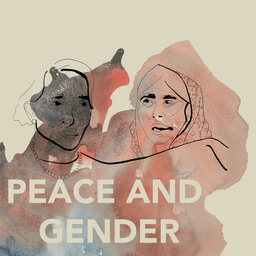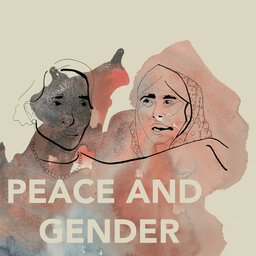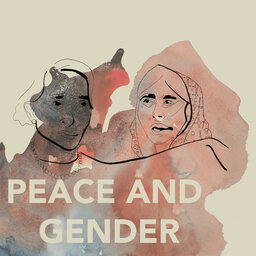What happens to women when conflict comes to an end?
In this episode of Peace and Gender, Andrea Thiis-Evensen meets up with PhD student Sarah Hewitt, who is working on a project looking at what actually happens to women, after peace provisions are put in place, in post-conflict areas. How do women experience the gender provisions, and do they actually work?
TRANSCRIPT
[Opening theme]
Andrea Thiis-Evensen: Hey. My name is Andrea Thiis-Evensen and welcome back to Peace and Gender. In this podcast, I'm trying to look at different gendered inequalities, meeting the people who are actually seeking solutions and making change, and getting to know both their research and their personal story.
Sarah Hewitt: We've got women's participation in peace processes. We've got these gender provisions being really important to be included in peace agreements. What happens afterwards? What actually happens to women's participation? How are these provisions being implemented?
Andrea Thiis-Evensen: That is Sarah Hewitt. Sarah is a PhD student at Monash University. She focuses on how women's participation in peace processes influences the incorporation of gender provisions in peace agreements.
Sarah Hewitt: You know, if women in the peace process did participate, what happens to their participation after an agreement has been signed? What happens to the networking or the civil society organisations that are included or that are mobilised, informally, around these peace processes?
Andrea Thiis-Evensen: What does really happen after gender provisions are implemented?
Sarah Hewitt: It's important to say, okay, there's been all this attention on why women need to be present and why women need to participate in these forums that are creating these documents. It's also important to say, okay, these documents have been created but what happens to them? How are women interacting with them? How are they deploying these rights? How are they using them? How are they utilising to advance women's rights, to advance their own participation, to advance their own bodily autonomy?
Andrea Thiis-Evensen: Sarah is part of a long-term project, which is mapping gender provisions of peace agreements. Sarah is in charge of two countries: Kenya and Nepal. There is a reason why she made this choice.
Sarah Hewitt: The reasons I look at these two countries was because they had a peace process after 2000. They both had peace processes that resulted in really gender-sensitive constitutions. They had these agreements and then they had this constitutional process. Gender provisions, within these constitutions, it brought about increases in women's parliamentary representation, for instance. It kind of made it constitutional that women have equal access to inheritance and equal access to property, which is so important for their economic autonomy, right? For them to be able to decide over their livelihoods. For Nepal, it's the first country in Asia and the Pacific to have a constitutional gender provision protecting sexual minorities.
Andrea Thiis-Evensen: Before learning more about her project, I wanted to know more about why Sarah started getting involved with international relations and why she's so interested in peace and women's experiences of peace.
Sarah Hewitt: I was born in South Africa and my mum was a journalist in South Africa during the Apartheid era. When she had my older brother, she had to quit her job, because my dad was training to be a surgeon. She had to be - go into that caring role of motherhood. She never got back into journalism, because we moved around a lot for my father's job and we ended up in Tasmania. I think, because of my mum, right? She had been there during that time, where she saw racial and sexual marginalisation at a huge and horrific scale. She would talk about it and they'd have great dinner parties where they'd discuss politics and things like race and gender. From an early age, I was exposed to those kind of social justice ideas, which led me to leave Tasmania and go to university and do a bachelor of arts, majoring in International Relations and Political Science.
Andrea Thiis-Evensen: It was kind of because of your mum.
Sarah Hewitt: It was kind of because of my mum. Yeah, for sure.
Andrea Thiis-Evensen: The project that Sarah is a part of, which is called Towards Inclusive Peace: Mapping Gender Provisions of Peace Agreements, is looking at 20 countries.
Although gender provisions are put in place in post-conflict areas, what actually happens to the women after this? The project Sarah is a part of focuses on hearing the stories of these women, hearing their voices - how they experience the gender provisions.
Sarah Hewitt: There's not much documentation of people's stories - how they organise, how a woman's rights activist got to where she is, right? Someone who works in women's civil society - what is their story? It's an extreme privilege to be able to listen to that and to be able to ask questions about that and try and create research that is beneficial to them at the same time.
Andrea Thiis-Evensen: Through working on this project and through her field work, Sarah has heard numerous stories from women about their experiences.
Sarah Hewitt: We were in quite this small space and we were looking out at this Acacia tree. It was a very African setting, right? It was really hot and sweaty and we were on these uncomfortable chairs after just driving for two and a half hours and eight hours the day before. We're sitting there with these women and so early and child marriage comes up. When I asked these women, well, how do we - what do you see as a strategy for keeping your young girls - your young daughters - out of early and child marriage? They were like, education, but there's really no option. We don't have an option. There is no strategy for us. I got really, really emotional, because you could see these invisible prison bars that were surrounding these women. They had no way of getting out, bar through education.
It's those kind of stories, I think, that really highlight the lived experiences of women in some spaces where they can't often get out of their predicaments. I don't really get much emotional in interviews or focus groups, because it's not my space, but all these lovely, lovely women were like, oh, are you okay? I had tears in my eyes. I was like, yeah, I'm sorry for crying. I just - I mean, there's no strategy. There's no problem solving here to get these women out of the situation of seeing their daughters being married off, at the age - probably to a man, an older man, who may have one or two wives already - getting married off at 13 or 14 or even 12. It's just tough. You hear those kinds of stories all the time.
Andrea Thiis-Evensen: However, Sarah says that it's not all doom and gloom.
Sarah Hewitt: These women are incredible. What was really interesting in Kenya, for instance, was how these constitutional gender provisions, they provided a stepping stone for women to say, no, I have a right to space. I have a right to speak my mind. I have a right to be here and claim these rights. They're not passive in this. These gender provisions have provided a space for them to kind of claim stakes in the fight that's being enacted onto their bodies.
Andrea Thiis-Evensen: After conflict occurs, gender relations within households change.
Sarah Hewitt: During conflict, for instance, there's a lot of feminist literature that discusses how changing gender relations during conflict, where women's seclusion within a household is no longer affordable. A lot of men go off to war, or go off to fight, or get killed. Women have to come out of the household. What this has shown is that these changing gender relations - women have come out in the public sphere, but are they going to go back into the private sphere once so-called peace comes? How can we utilise these changing gender relations at this critical opportunity or this critical moment of peace-making or peace processes, to kind of solidify this transformation of gender relations, where women are in the public? They're not relegated back to the private sphere. How can we use that to make sure that women's rights are in these provisions, so they do have a basis for women to claim their rights? A lot of the times, this doesn't happen.
Andrea Thiis-Evensen: Both the term post-conflict or just conflict in general, and the word peace has different gendered meanings.
Sarah Hewitt: Conflicts aren't just these big things with guns. It's also within a household, negotiation between men and women, husbands and wives, between daughters and fathers, fathers and sons. All of these gender dynamics - how are they being affected? Let's define peace, right? That's really problematic. That's something that I've kind of been struggling with my research, because we're looking at the post-conflict. I mean, the research has shown us that post-conflict for women is not post-conflict. Often, there is a rise of violence against women in post-conflict times. You have peacekeeping economies that emerge, where you have these peacekeeping forces that come into these communities and there's a rise of the sex trade, for instance. Post-conflict, ooh. It's also something that needs to be interrogated, in regards to these documents. So much of the time, it's not post-conflict for women.
Andrea Thiis-Evensen: Peace is very different for men and women.
Sarah Hewitt: Even outside of feminist circles or even critical theorists, there is no discussion of how peace that is created currently is created by men who have been extremely privileged due to patriarchal privilege, right? Where peace and militarism and patriarchy and militarism is so tied in with each other, that how can you expect a peace that actually affords women peace, right? The peace that only looks at peace within the public sphere, how can that benefit women? It can't, because their priorities are not heard. Their needs are not considered. Their wants and their safety is only scarcely looked at.
Andrea Thiis-Evensen: The project has contributed to how Sarah has structured her PhD, with some of her theses looking at violence against women in politics.
Sarah Hewitt: What came out of my Kenya research was just the amount of harassment and intimidation that women experience. Because there are these gender provisions that say women have to participate in such-and-such ways, women have to do it, right? There's no structures within those provisions that provides safety for women in carrying these provisions out. There was one instance that I heard about, in Kenya, where a woman who was vying for a governor position - there'd never been a female governor before - a women who was vying for the governor position, her opponent organised a bunch of women to throw pig's blood on her. The reason for this was so her opponent could say, she can't even take care of her own period. How do you expect her to take care of a county?
It's drawing these connections between women's sexuality, women's morality, and attitudes towards leadership that is indicative - and these manifestations of violence and harassment. They're so indicative of why the patriarchal underpinnings of how Kenyan society, anyway, functions. There was this other woman in this regional town that I met and she was telling me her story. She was young and to be young in Kenya - age is seen as something that is to be respected. This woman, she was going for a local constituency for the local government. She had a relatively successful business and she decided that, no, there's this new constitution in place. I'm going to go vie for - to be a politician. Her constituency really liked her and she invested all of her money and all of her business. Her husband ended up leaving her because he didn't want a publicly active life. She won, which is fantastic, right?
Andrea Thiis-Evensen: This woman was in the party nomination phase, which you need to win to get into the official election. She had to travel to Nairobi, to get her nomination slip.
Sarah Hewitt: She got to Nairobi and when she went to go get her nomination slip, they'd given it to her male opponent. It was an actual theft of her candidacy, because she was a woman. She was a young woman. It was just like, she has no recourse to justice. There's no way for her to go and for her to say, look, this guy stole my candidacy. He's now in parliament - well, the local parliament. It's just, I think, so indicative of just the wider problems of intimidation that women face when they are in public spaces and when they're strong women.
There's such a move towards getting meek women into these spaces. There's this fascinating phenomena that has occurred in Kenya, where at local-level governments, nominated women - so they're not elected. They're nominated to fill a gender quota. They get way less resources, way less influence, way less decision-making power. They don't get any staff, I don't think, depending on county to county but they get hardly any staff to support them. They're just called flower girls. They'll be called into a meeting. Decisions will already be made, but they'll have to have a tick box to say a woman was included in this meeting. The decision was made. Come in and, yep. This is all good.
This has all satisfied the gender requirements that are imposed upon us. On one level, there's such a lack of implementation of a lot of these provisions and a lot of these agreements and stuff. Just as there are laws, so policies and legislation that is passed, which is really great because it sets up the legal framework but the reality is very, very different.
Andrea Thiis-Evensen: That was Sarah Hewitt. Thank you so much for listening to this episode of Peace and Gender. My name is Andrea Thiis-Evensen and this podcast was produced for Monash Gender, Peace, and Security and Mojo News.
Music: "Solitude" by Broke for free – Creative Commons Attribution-NonCommercial-
Artwork: Shayla Rance
 Peace and Gender
Peace and Gender

